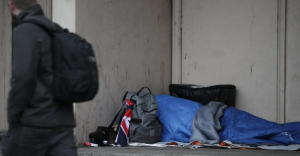That’s right, Helsinki Finland. According to Mat Trewern of BBC Radio Manchester, the city has used a groundbreaking program to virtually eradicate homelessness. According to the newscaster one thing that stands out as unusual at Helsinki’s central train station on a bitter cold night is that are no homeless sleeping…. And no one begging. And the trend in homelessness is down across Finland from 18,000 in to 1987 to 6,600 in 2017 with the number continuing to drop. According to the Housing and Development Centre of Finland the number was 3,686 in 2022.

Growing homelessness is something virtually every country on the planet is grappling with. Accurate numbers are hard to come. When lasted attempted by the United Nations in 2002 their estimate was that 100 million people were homeless around the world and The World Economic Forum’s 2021 estimate was 150 million. In 2023 Daniil Filipenco, writing for Development Aid, reported that
According to the U.S. Department of Housing and Urban Development’s Annual Homeless Assessment Report were roughly 647,000 in 2007. According to their 2023 report the number was 653,100, about a 10% increase. That is not something I think we should be proud of given Finland’s 55% reduction between 2017 and 2022, and 37% reduction 1987 to 2017.
I think we here in the U.S. need to consider the same thing the U.K. is doing – asking what are they doing in Finland? What can we learn? And, what can we take from it and scale and implement? According to Mat Trewern, since 2007 the Finnish government has implemented policies based on the foundation principles “Housing First.” They give people who are or become homeless a permanent home of their own as soon as possible. It then, in short order provides them the support they need… tackling drug addiction, assisting them to learn new skills or helping them to get into training or educational programs and actual work. This is very different from the U.K. and U.S. which focuses on temporary homeless shelters.
With “Home First” the offer of a home is unconditional – even if they are still taking drugs or abusing alcohol they still get to stay in their home as long as they are interacting with their support team. They can pay rent through government hosing benefits and can stay I chose stay in the provided housing for the rest of their lives, or move on as their lives improve. Tenants in these complexes share a communal kitchen and shared common areas but their homes/apartments are theirs, private with key access . They decorate and furnish as they choose. Some tenants have jobs at the complex (cooking, janitorial, maintenance, gardening) that provides skills and helps build work histories that lead to better jobs.
The U.K. is starting pilot programs in select areas. Small scale trials run by the Salvation Army are in place in Wales. One of the leaders of the initiative in Finland , Juha Kaakinen, acknowledges the challenges for the program in larger countries. Availability of house, cost of the housing. In his view in order for the program to be implemented an succeed two things are key… It has to be a national effort, not piecemeal and the housing crisis as a whole has to be dealt with… the issue of housing availability and affordability for all has to be addressed. “The main issue seems to be lack of affordable social housing. To solve homelessness that is something you need, says Kaakinen.
